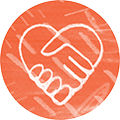
Understanding mental health stigma and discrimination and its impact
 Spotlight on learning from local partner Moray Wellbeing Hub
Spotlight on learning from local partner Moray Wellbeing Hub
The content displayed on this page was produced by Moray Wellbeing Hub and describes their reflections, experiences and learning over the years about lived experience leadership in driving change in healthcare / mental health services.
Visit Moray Wellbeing HubHere we provide key definitions, before getting into the ins and outs of stigma and discrimination.
It is helpful to have an understanding of what mental health stigma and discrimination looks like and its impact, as well as how you can challenge it when it happens. Let’s start by looking at some definitions, before getting into the ins and outs of stigma and discrimination.
- What is mental health?
- What is mental health stigma and discrimination?
- How does mental health stigma and discrimination affect people?
- Mental health stigma and discrimination in healthcare
What is mental health?
According to WHO (World Health Organisation) ‘mental health’ is a basic human right, and defines ‘mental health’ as a state of mental wellbeing that enables people to cope with the stresses of life, realise their abilities, learn well and work well, and contribute to their community. It is an integral component of health and wellbeing that underpins our individual and collective abilities to make decisions, build relationships and shape the world we live in. However, it is worth noting that there is no universally agreed definition of ‘mental health’, so it is always important to take communities and individuals’ own views into account when referring to mental health.
What is mental health stigma and discrimination?
We all have mental health, just as we all have physical health. Despite increased awareness of mental health across Scotland, stigma and discrimination associated with mental health continue to be a big barrier for many. Also, many people experience multiple intersecting stigmas; for example, people with additional substance use challenges which is why Rights, Recovery, Respect: Scotland’s Alcohol and Drug Treatment strategy includes special focus on mental healthcare.
“I was self-medicating with one drug, but the GP gave me even more addictive medications and described me as an addict. I now don’t want to contact them in case all they do in push me to take more medication and make me feel worse.” Moray Champion (2024)
If one in three people in Scotland experience mental health problems, and around two thirds of those face stigma and discrimination, that’s over a million people in this country who are being treated unfairly when they’re struggling.
See Me defines ‘mental health stigma’ as: “the negative attitudes or beliefs based on a preconception, misunderstanding or fear of mental health, and ‘mental health discrimination’ as: when a person performs an action, whether intentional or unintentional, that creates barriers and inequality for people with lived experience of mental health problems.”
Mental health stigma and discrimination doesn’t just happen in interpersonal interactions; for example, with healthcare professionals. It’s often rooted in how organisations, systems, processes and policies are established. Institutionalised mental health stigma and discrimination can be defined as: “the collective failure of an organisation to provide an appropriate and professional service to people because of their mental health. It can be seen or detected in processes, attitudes and behaviour which amount to discrimination through unwitting prejudice, ignorance, thoughtlessness and mental health stereotyping”.
Stigma and discrimination can make people who are unwell feel worse and may discourage them from seeking help.
Stigma can be broken down into the following types of stigma, which are all interlinked:
- Self-stigma: the judgement people put on themselves, which has often come from hearing and seeing external stigma and discrimination
- Public stigma (sometimes known as prejudice): when people form an opinion before becoming aware of and understanding the relevant facts
- Stigma by association: experienced by someone because of their connection to people with mental health problems, e.g. family member or friend, or someone they care for
- Structural stigma: When the rules, policies, and practices of social institutions restrict the rights of, and opportunities for, people with mental health problems. This could be a policy at work which automatically puts people with mental health problems at a disadvantage due to the wording or terms
- Intersectional stigma: describes how social identities and structural inequities shape and influence each other. This means we cannot understand any one stigma (more often discussed in terms of prejudice when related to other protected characteristics) in isolation from another, which might simultaneously be at play, compounding negative experiences, e.g. of services as well as health outcomes.
“I have also had it recorded in my notes that being LGBT is proof of ‘unstable sense of self’, as well as dressing androgynously.” Scottish Mental Illness Stigma Study (See Me, 2022)
“Services are still kind of advising things like, black people have a higher threshold for pain than white people. That’s still something that’s being taught in the medical community, which is complete nonsense, you know and then they wonder why black women are having more complications and death through childbirth, it’s because of pains not being taken seriously. So how do we expect our mental health to be taken seriously when we access these Services.” Suicide ideation – experiences of adversely racialised people (Jackson et al., 2022: pp. 14-16)
“Going to get help with my hypothyroidism has been made significantly harder by being told it's anxiety. The conversation is not focused on the topic but moved onto something I'm supposed to be self-managing.” Moray Champion (2024)
Often, the people behaving inappropriately may not mean to cause harm and are ignorant of the negative impact of their actions or words. Simply explaining the situation may be enough for people not to make the same mistakes again.
However, phrases and words will still crop up in our day to day lives from direct conversations, our experiences and in the media.
Phrases like 'pull yourself together' or 'there are people worse off than you' can hurt and affect those experiencing mental health problems.
Casual stigma continues to be common in Scottish society. Some examples include
- Language used - “she’s totally psycho”, “you’re so bipolar”, “I’m a bit OCD about that”, “don’t be mental”
- Reinforcing stereotypes - like ‘mental patient’ Halloween costumes or characters with mental health problems being portrayed as dangerous on TV
- Unhelpful comments - “Don’t go near that psycho if you value your life”
- Pictures used in the media to depict mental health problems - like photos of people clutching their heads.
How does mental health stigma and discrimination affect people?
Despite the strong, positive (local and national) policy and action focusing on mental health, equality and human rights, people who have mental health problems continue to experience inequality in a number of areas, such as in education and employment, which can lead to people:
- Experiencing poorer physical health
- Having their life expectancy shortened
- Experiencing poorer quality of life overall.
The stigma and discrimination people face within public and private services, including within healthcare, directly contributes to this.
A substantial number of people continue to experience stigma and witness or experience unfair or different reactions because of their mental health. This can lead to people getting varying levels and types of support or treatment. Sadly, people who have a diagnosis of severe and enduring mental illness experience the greatest stigma and discrimination.
According to The Lancet Commission on ending mental health stigma and discrimination (2022), many people describe the stigma and discrimination they experience in services as worse than the diagnosis of a mental health problem. People are affected by multiple forms of discrimination at the same time and have been disadvantaged by unfair and oppressive systems like racism, homophobia, patriarchy etc. These systems often remain unquestioned and successfully uphold the inequalities (in this case healthcare) for some groups based on their race, gender, sexual orientation, disability etc. These compounding and overlapping experiences of discrimination are also known as Intersectional stigma.
“As a man I feel judged if I share my emotions and I’ve been told to ‘just man up’ in the past from healthcare workers.” Moray Champion (2024)
Some people also experience self-stigma, where they can think they don't deserve help and support, or that their issues aren't serious enough or are somehow their own fault. This feeling isn't a choice but comes about as a reaction to having experienced discrimination, trauma or societal conditioning, including in healthcare.
Stigma and discrimination in healthcare isn't always just a case of people being judgmental or treating people unfairly out of choice, but because the system is set up in a way that causes stigma and discrimination. The norms, rules, policies and practices of institutions and services can unintentionally restrict the rights of, and opportunities for, people with mental health problems.
Stigma and discrimination relating to mental health can take lots of different forms, and affect people in different ways, including difficulty in finding and keeping a job and being treated fairly in work; isolation from friends, family and daily activities, and having their problems undermined or not taken seriously.
Mental health stigma and discrimination in healthcare
According to the 2022 Scottish Mental Illness Stigma Study, healthcare is a major area where stigma and discrimination are frequently experienced by people who reported living with severe, complex and/or enduring mental illness in Scotland.
“My cardiac arrhythmia took three years to diagnose as they kept telling me it was my mental health and didn’t investigate… They were very wrong… I was at risk of stroke just because they refused to believe me. It’s very difficult to get people to believe you when you have a mental health diagnosis, as they presume you aren’t truthful/attention/medication seeking. Mental health stigma is real; I could have died.” A study participant
Many people reported unfair treatment by healthcare professionals, which affected their expectations and experiences with healthcare services. 77% reported receiving inappropriate or inadequate healthcare, due to stigma about their mental health.
Mental healthcare was the fourth most commonly selected life area against frequency of stigma and discrimination experienced. The majority of people with mental illness (74%) say they experience discrimination in the very place they go to get help.
People say they have been unfairly denied help, experienced unfair treatment from healthcare professionals and administrative staff, and have been excluded from having a say in decisions about their own healthcare. For example, 81% reported having been unfairly denied help for their mental illness(es).
“Because of my BPD diagnosis, I have had crisis team staff hang up on me even when I’m feeling as though I couldn't keep myself safe. I was discharged from my CMHT by a psychiatrist who never spoke to me once, but decided to discharge me anyway. I have been called "attention seeking", "manipulative" by services. I feel as though mental health services don't take me seriously because of stigma around my diagnosis.” A study participant
